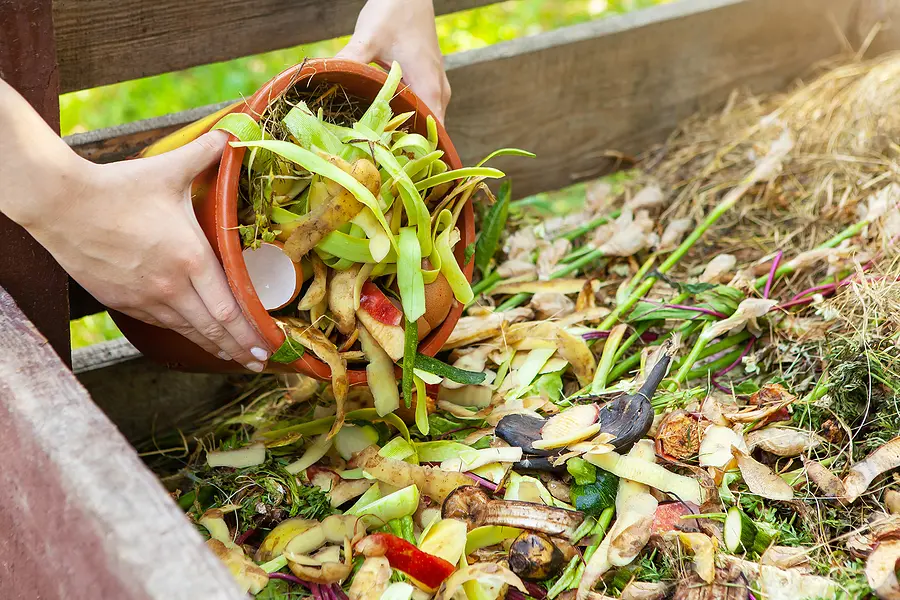Composting for Effective, Office Kitchen Waste Management
By: Dan Alvin

In the hustle and bustle of daily office life, the office kitchen is often an overlooked area when it comes to waste management. However, creating a clean and hygienic space for employees in the office kitchen is of paramount importance. In this article, we will explore the various aspects of office kitchen waste management and how it can contribute to providing a healthier and more pleasant environment for employees.
Importance of Office Kitchen Waste Management
A cluttered and unclean office kitchen not only affects the physical health of employees but also has a significant impact on their morale and productivity. Proper waste management ensures that the office kitchen remains organized and free from unpleasant odors and pests.
We discover how composting can help reduce your environmental footprint. By turning food scraps and yard waste into nutrient-rich soil, you can divert waste from landfills and reduce greenhouse gas emissions.
Composting not only benefits the environment, but it also promotes sustainable agriculture, improves soil health, and increases biodiversity.
Start integrating composting into your everyday life and join the fight against climate change today.

The Environmental Benefits of Composting
You should regularly compost your organic waste to significantly reduce your impact on the environment. Composting is a simple and effective way to divert organic materials from landfills, where they’d otherwise contribute to harmful greenhouse gas emissions. When organic waste, such as compostable food packaging and yard trimmings, decompose in landfills, they produce methane, a potent greenhouse gas that contributes to climate change. By composting these materials instead, you can help to minimize methane emissions and reduce your carbon footprint.
Composting also has the benefit of enriching soil health. The finished compost, often referred to as ‘black gold,’ is a nutrient-rich fertilizer that can be used to improve the quality of soil in gardens, lawns, and agricultural fields. When you add compost to your soil, it helps to retain moisture, suppress weeds, and improve overall plant health. This means you can reduce your reliance on synthetic fertilizers and pesticides, which can have negative impacts on the environment and human health.
Additionally, composting helps to conserve water. When you use compost in your garden or landscaping, it improves the soil’s ability to retain moisture, reducing the need for frequent watering. This not only saves water but also reduces the energy required to pump and treat water, further reducing your environmental impact.

Reducing Landfill Waste Through Composting
By diverting organic waste from landfills and composting it instead, you can significantly reduce the amount of waste that ends up in these facilities. Landfills are rapidly filling up with waste, and this has become a major environmental concern. When organic waste, such as food scraps and yard trimmings, decomposes in landfills, it produces methane gas, a potent greenhouse gas that contributes to climate change. By composting this waste, you can prevent the release of methane into the atmosphere.
Composting is a natural process that turns organic waste into nutrient-rich soil amendment. When you compost, you provide the ideal conditions for microorganisms to break down the waste materials, resulting in a dark, crumbly substance known as compost. This compost can then be used to enrich the soil in your garden or landscaping, reducing the need for chemical fertilizers.
In addition to reducing methane emissions, composting also helps to reduce the need for landfill space. By diverting organic waste from landfills, you can extend the lifespan of these facilities and reduce the need for new ones to be built. This not only saves valuable land resources but also reduces the environmental impact associated with constructing and operating landfills.
Composting and the Fight Against Climate Change
Composting can contribute to the fight against climate change by reducing greenhouse gas emissions. When organic waste, such as food scraps and yard trimmings, is sent to landfills, it decomposes and produces methane, a potent greenhouse gas. However, by composting these materials instead, we can significantly reduce methane emissions and mitigate climate change.
 By composting, we not only prevent organic waste from producing methane, but we also generate a valuable resource. Compost can be used to improve soil health and promote plant growth, reducing the need for chemical fertilizers. This closed-loop system helps to decrease the carbon footprint of agriculture while fostering sustainable practices.
By composting, we not only prevent organic waste from producing methane, but we also generate a valuable resource. Compost can be used to improve soil health and promote plant growth, reducing the need for chemical fertilizers. This closed-loop system helps to decrease the carbon footprint of agriculture while fostering sustainable practices.
Moreover, composting supports the circular economy by diverting organic waste from landfills and returning nutrients back to the soil. It reduces the demand for synthetic fertilizers, which are energy-intensive to produce and contribute to greenhouse gas emissions.
Promoting Sustainable Agriculture With Composting
And together with composting, we can promote sustainable agriculture by improving soil fertility and reducing the need for chemical fertilizers. By incorporating compost into agricultural practices, you can enhance the health and productivity of your soil. Compost is rich in organic matter, which helps improve soil structure, retain moisture, and promote beneficial microbial activity. As a result, your crops will have access to essential nutrients, water, and air, leading to healthier plants and increased yields.
Composting also reduces the need for chemical fertilizers, which can have negative environmental impacts. Chemical fertilizers often contain high concentrations of nitrogen, phosphorus, and potassium, which can leach into groundwater and cause pollution. By using compost instead, you can provide a balanced and slow-release source of nutrients to your soil. This not only reduces the risk of water contamination but also minimizes nutrient runoff, which can contribute to algal blooms and other water quality issues.
Furthermore, composting can help you reduce waste and save money. By diverting organic materials from landfills and turning them into compost, you can reduce your carbon footprint and contribute to a circular economy. Additionally, purchasing chemical fertilizers can be costly, while composting allows you to create a nutrient-rich soil amendment for free or at a minimal cost.
Composting to Improve Soil Health and Biodiversity
Improve the health and biodiversity of your soil by incorporating composting into your gardening practices. Composting is a simple and effective way to enhance the quality of your soil, making it more fertile and nutrient-rich. When you add compost to your garden, it helps to improve the structure of the soil, making it easier for plants to grow and thrive.
The organic matter in the compost also acts as a sponge, holding moisture in the soil and reducing the need for frequent watering.
In addition to improving soil structure and moisture retention, composting also promotes biodiversity in your garden. The rich organic matter in compost provides a habitat for a wide range of beneficial microorganisms, earthworms, and other soil-dwelling creatures. These organisms play a vital role in breaking down organic matter and releasing nutrients into the soil, creating a healthier and more balanced ecosystem.
By composting, you aren’t only recycling organic waste but also creating a sustainable cycle of nutrients for your garden. Instead of relying on synthetic fertilizers, which can have harmful effects on the environment, composting allows you to nourish your plants naturally. This helps to reduce the use of chemical inputs and minimize the release of greenhouse gasses associated with the production and transportation of synthetic fertilizers.
Incorporating composting into your gardening practices is a win-win situation. You’ll be improving the health of your soil, promoting biodiversity, and reducing your overall impact on the planet. So why not start composting today and reap the many benefits it has to offer? Your garden and the environment will thank you.
Integrating Composting Into Everyday Life
To make composting a seamless part of your daily routine, start by incorporating it into your kitchen and gardening activities.
In the kitchen, designate a small countertop container for collecting food scraps, such as fruit and vegetable peels, coffee grounds, and eggshells. Instead of throwing these items in the trash, simply toss them into the container. This not only reduces waste but also provides a convenient way to gather compostable materials throughout the day. When the container is full, transfer the contents to your outdoor compost bin or pile.
In the garden, use compost as a natural fertilizer and soil amendment. Mix it into your flower beds, vegetable patches, and potted plants to enrich the soil and promote healthy plant growth. Compost adds essential nutrients, improves soil structure, and retains moisture, reducing the need for synthetic fertilizers and excessive watering.
Additionally, consider creating a composting schedule that fits your lifestyle. Whether you choose to turn your compost pile weekly or monthly, find a routine that works best for you. Regularly monitor the moisture levels and temperature of the pile to ensure optimal decomposition.
Lastly, educate yourself about what can and can’t be composted. Avoid adding meat, dairy, and oily foods to your compost, as they can attract pests and slow down the decomposition process. Instead, focus on composting fruit and vegetable scraps, yard waste, leaves, and coffee grounds.
Conclusion
So, now you know how composting can greatly reduce our impact on the planet.
By diverting organic waste from landfills, we not only reduce methane emissions but also contribute to healthier soil and biodiversity.
Composting is a simple yet powerful solution that can be integrated into our everyday lives.
So, why not start composting today and make a positive difference for our environment?
1337 Views












